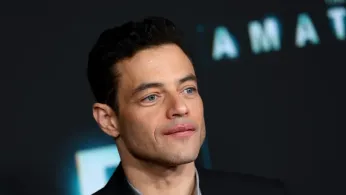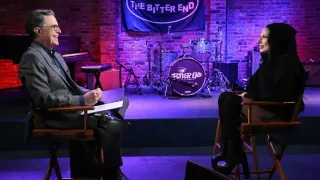
4 hours ago
Acclaimed Queer Filmmaker Ira Sachs Begins Production on AIDS-Era Musical "The Man I Love" Starring Rami Malek
READ TIME: 4 MIN.
Acclaimed queer filmmaker Ira Sachs has begun principal photography on his latest project, "The Man I Love," a musical drama that explores the intersection of art, love, and mortality during the height of the AIDS crisis in late 1980s New York City . The film, which started shooting on September 29, 2025, represents a significant artistic undertaking for Sachs, who has built a reputation for intimate, emotionally complex narratives within LGBTQ+ cinema .
The project centers on Jimmy George, a downtown theater artist navigating what the production describes as "an extraordinary moment between great illness and death when, still, all beauty and love is possible" . This premise places the film squarely within the tradition of AIDS cinema while promising to offer a fresh perspective through its musical format, described by the filmmakers as a "musical fantasia of a city under duress" .
Oscar winner Rami Malek headlines the ensemble cast as Jimmy George, stepping into a role that was originally intended for Ben Whishaw . The casting change occurred just days before production began, with Malek taking over the lead role in what marks his return to independent cinema following his Academy Award win for "Bohemian Rhapsody" .
Joining Malek is a distinguished ensemble including BAFTA nominee Rebecca Hall, known for her work in both independent and mainstream productions, Tom Sturridge, and Ebon Moss-Bachrach . The casting reflects Sachs' continued commitment to working with accomplished performers who can navigate the complex emotional terrain his films typically explore.
Ira Sachs, born in Memphis, Tennessee in 1965, has established himself as one of the most consistent voices in American independent cinema, particularly within LGBTQ+ storytelling . His filmography includes critically acclaimed works such as "Passages," "Frankie," "Little Men," "Love is Strange," and "Keep the Lights On," which won the Teddy Award at the 2012 Berlinale .
Particularly relevant to "The Man I Love" is Sachs' previous work addressing the AIDS crisis. His short film "Last Address," which honors a group of New York City artists who died of AIDS, has been included in the permanent collections of both the Whitney Museum and the Museum of Modern Art . This background suggests that "The Man I Love" will bring both artistic sophistication and authentic understanding to its subject matter.
As the Founding Director of Queer|Art, a non-profit organization that provides support for LGBTQ+ artists across film, performance, literature, and visual arts, Sachs has demonstrated a sustained commitment to nurturing queer artistic voices . This institutional involvement underscores his position not just as a filmmaker but as an advocate for LGBTQ+ representation in the arts.
The film is being produced under a SAG-AFTRA Theatrical Agreement, with the production welcoming both union and non-union talent, including first-time actors . This inclusive casting approach aligns with the film's themes of community and artistic expression during a time of crisis.
Principal photography is scheduled to continue through October 31, 2025, with filming taking place in the New York City metropolitan area . The choice to shoot in New York is particularly significant given the city's central role in both the AIDS crisis and the cultural response to it during the 1980s.
The production's pay structure reflects industry standards for independent films, with principal and speaking roles compensated at $1,246 per day plus a 10% adjustment fee, while background talent receives $224 per day plus the same adjustment . These rates demonstrate the production's commitment to fair compensation within the independent film sector.
"The Man I Love" arrives at a moment when AIDS-era stories are receiving renewed attention in popular culture, with recent works like "It's a Sin" and "The Normal Heart" revival bringing these narratives to new audiences. However, Sachs' approach promises to distinguish itself through its musical format and focus on the creative process itself.
The film's subtitle as a "musical fantasia" suggests an approach that may blend realism with more stylized elements, potentially offering audiences a unique perspective on how art and creativity can flourish even in the face of terminal illness and societal crisis . This artistic choice reflects broader trends in contemporary LGBTQ+ cinema toward more experimental and genre-blending approaches to historical material.
Sachs' status as a 2013 Guggenheim Fellow underscores the artistic recognition his work has received within the broader cultural community . This institutional support, combined with his track record of festival success and critical acclaim, positions "The Man I Love" as a potential significant entry in the awards conversation for 2026.
The film's exploration of AIDS-era New York also connects to broader conversations about LGBTQ+ history and representation. As communities continue to grapple with the ongoing impacts of the AIDS crisis and work to preserve the stories of those who lived through it, projects like "The Man I Love" serve important cultural and historical functions beyond their entertainment value.
The screenplay for "The Man I Love" was co-written by Sachs and Mauricio Zacharias, suggesting a collaborative approach to the material . This partnership may bring additional perspectives to the historical and cultural elements of the story, particularly important given the sensitivity required when depicting the AIDS crisis.
The film's casting process, handled by Damian Bao Casting, explicitly welcomed performers without prior acting experience, indicating a commitment to authentic representation that extends beyond the principal cast . This approach aligns with documentary and neorealist traditions while serving the film's apparent goal of capturing the diverse artistic community of 1980s New York.
As production continues through October 2025, "The Man I Love" represents both a personal artistic statement from one of independent cinema's most respected LGBTQ+ voices and a contribution to the ongoing cultural project of preserving and interpreting AIDS-era experiences for contemporary audiences. The film's completion and eventual release will likely position it as a significant entry in both Sachs' filmography and the broader canon of LGBTQ+ cinema addressing this crucial historical period.






